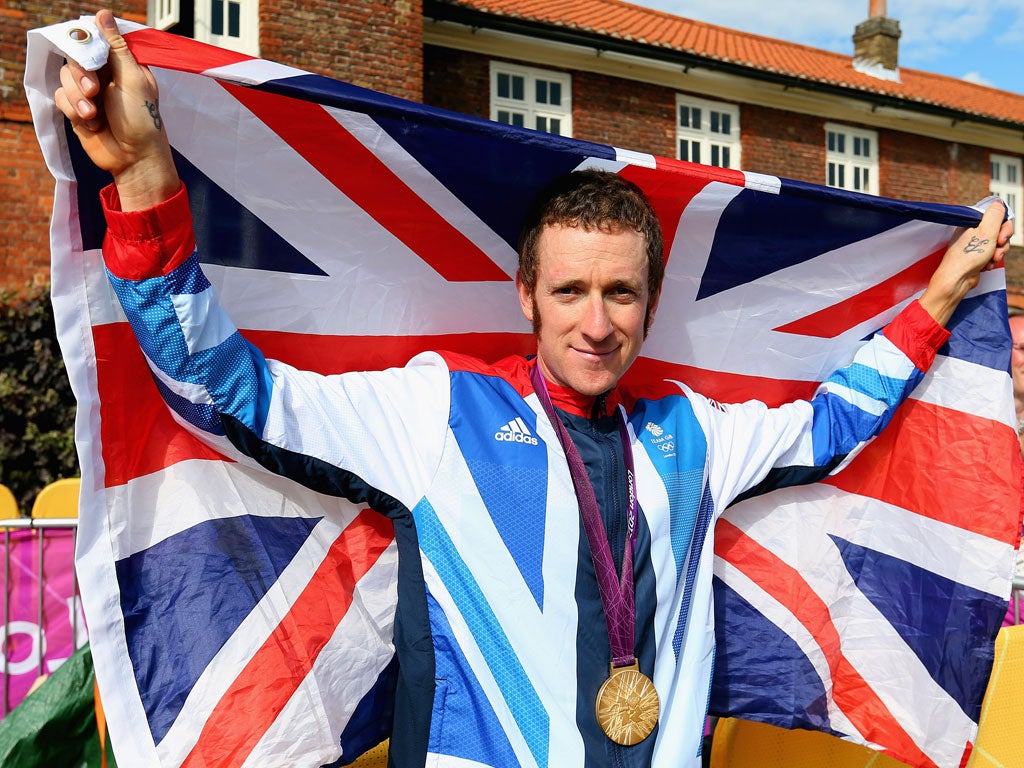Bradley Wiggins' athletic versatility is evident in his success

Before today’s time trial win, Bradley Wiggins emphasised that one of the biggest appeals of going for gold in this discipline was that it showed his athletic versatility - and given the last time we saw him on an Olympic podium was inside Laoshan velodrome in Beijing celebrating victory in the pursuit event, both individual and team, back in 2008, there is certainly no denying that.
Part of this flexibility is due to his innate physiological qualities, but it can also be linked to Wiggins' vast appreciation of cycling history and sense that he is breaking down barriers in it between different disciplines. I can recollect talking to Wiggins in 2009 when he completed his first ever Paris-Roubaix, a hugely prestigious and notoriously difficult one-day ‘Classic’ where riders pound for miles across half-ruined cobbled farmtracks of northern France.. Wiggins finished a very respectable 25th, but for him the result was not really important: he told me he was proud merely to have been able to taken part and completed Paris-Roubaix, to have his own place, however tiny, in a huge canvas of sporting achievement.
At the same time, road racing and training has always been used by track riders as a way of building up their endurance for the velodrome, and from 2001, when Wiggins turned pro for a series of French teams, up until 2009, there would be wins on the road in this period for the Londoner, but they would almost exclusively come in relatively low-level time trials.
The track, up until the 2008 Olympics, was a very different story. Six times a World Champion, in endurance events ranging from the Madison with Mark Cavendish in 2008 to the Individual and Team Pursuit, for three successive Olympics from 2000 to 2008 Wiggins racked up at least one medal inside the velodrome, culminating in his double gold in Beijing. Together with Sir Chris Hoy and Victoria Pendleton, for nearly a decade Wiggins was one of the lynchpins of the British track squad: road victories were almost a bonus.
But then in 2009, his dramatic switch from focussing on track to road came after Wiggins realised in a Tour of Italy that he was climbing with the best without specific training for it. The rest is almost too well-known to be told: the record-equalling fourth place overall in the 2009 Tour, the 2010 near-debacle in the same race, the victory in the Criterium Du Dauphine stage race - another breakthrough - followed by the crash out in the Tour and the comeback, with third overall, in the Tour of Spain.
In 2012, the biggest step forward came first in taking a string of hugely prestigious week-long stage races. Even if he had stopped racing in June, Wiggins would have been the first ever rider to take Paris-Nice and the Criterium du Dauphine, France’s second and third most prestigious stage races, together with Switzerland’s almost equally important Tour de Romandie, in the same year. Romandie also saw Wiggins first ever bunch sprint victory - yet another sign of his willingness to experiment in the most unexpected of terrains.
The Tour, though, was a quantum leap in terms of versatility. Wiggins climbing, traditionally his weakpoint became the arena where he would turn the screw a step further on his rivals - and take yellow at the first summit finish. His time trialling, always a strength, simply underlined that superiority, with wins in both stages against the clock also a sign of what was to come yesterday in Hampton Court.
It is also hugely appropriate, in terms of British cycling culture, that we have a British Olympic time trial winner for a home Olympics. For many years, time trialling was the backbone of British cycling - road-racing was banned until the 1950s and its higher policing and marshalling costs have made it more difficult to organise, even today. And from Wiggins to David Millar, Chris Boardman and way further back, over the years countless British teenage cyclists first regular, week-in, week-out, experience of racing on the roads has been in club time trials ‘10s’ [10 miles long], 25s, or 50s.
Wiggins victory, then, in one sense, is the highest possible recognition of the most deep-rooted of British cycling traditions - and in another, takes Wiggins and his country’s cycling, both now at the pinnacle of the sport, back to where it all began.
Join our commenting forum
Join thought-provoking conversations, follow other Independent readers and see their replies
Comments